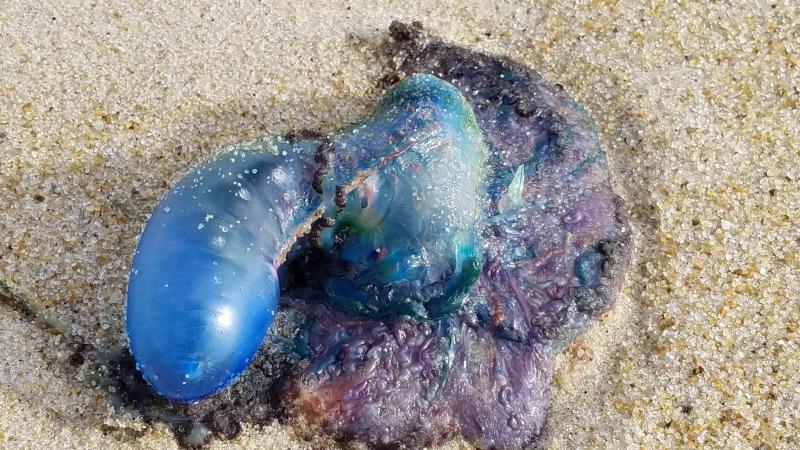Portuguese man-of-wars have been found in the sand along Fenwick Island and Delaware Seashore State Park.
Delaware Surf Fishing owner Rich King reported the appearance of the jellyfish-like creature Oct. 6, and warned fishermen and beachgoers to watch their step. The venomous tentacle of the man-of-war has potent neurotoxins that cause a painful sting, even after the creature has died.
The bladder of a man-of-war – which is not a jellyfish, but a hydrozoan, an animal made up of a colony of organisms – can have blue or purple hues. They float above the water while the dangerous tentacles linger below the surface.
Man-of-wars are typically found in tropical waters, but winds and currents can sweep them out of their normal territory.
Delaware State Beach Patrol Captain Kris Knutsen said there have been no reports or complaints about the man-of-wars, and everyone, including people wearing wetsuits for protection, should take extra caution, especially in the water, before and after storms.
Department of Natural Resources and Environmental Control officials say Hurricane Matthew, which is approaching the eastern coast of Florida, is likely to blame for the appearance of the man-of-wars.
“Portuguese man-of-wars are not native to Delaware coastal waters,” Knudsen said. “I have no doubt Hurricane Matthew will bring us many Caribbean souvenirs, including aquatic life, warmer waters, structural drift wood and debris.”
John Ewart of Delaware Sea Grant said Matthew be contributing to wind patterns and water pressure bringing man-of-wars ashore, but other weather systems have kept tides high in Lewes for days.
“There are wind forces out there that are not really allowing the normal tidal flow to take place,” he said. “Whether it’s from Matthew or just other prevailing weather patterns, I don’t know.”
The former lobsterman said personal experience with the creature’s sting confirms man-of-wars should not be taken lightly.
“You have to give them some space and definitely do not handle them, even with gloves,” he said. “This is not a common thing. They’re around, but they’re mostly offshore.”
In the case of a man-of-war sting, remove remnants of the tentacles without touching them directly (use protective hand wear). Rinse the area with salt water and apply hot water to the affected area for 15 to 20 minutes. Antihistamines may help alleviate sensitivity to the toxins, and people should advise lifeguards or beach personnel when they are stung. If symptoms are severe, seek medical attention immediately.





















































